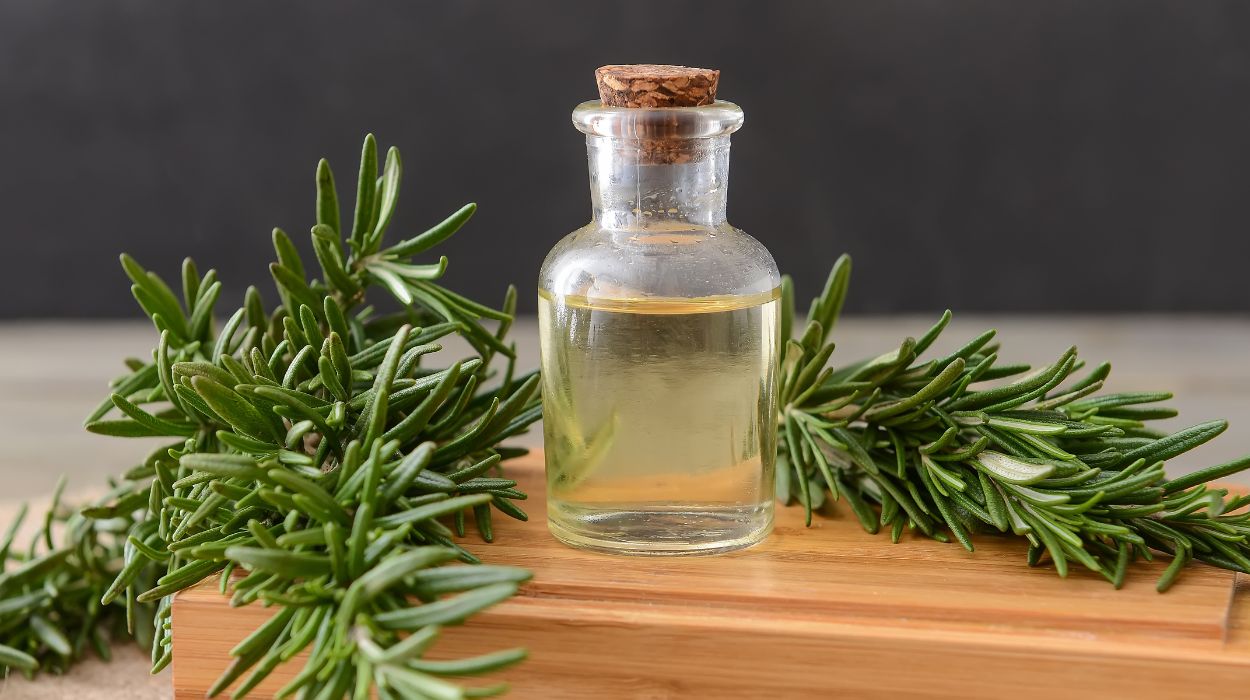 Expert's opinion
Expert's opinion
Expert's opinion
The article is a subjective view on this topic written by writers specializing in medical writing.
It may reflect on a personal journey surrounding struggles with an illness or medical condition, involve product comparisons, diet considerations, or other health-related opinions.
Although the view is entirely that of the writer, it is based on academic experiences and scientific research they have conducted; it is fact-checked by a team of degreed medical experts, and validated by sources attached to the article.
The numbers in parenthesis (1,2,3) will take you to clickable links to related scientific papers.
How To Use Rosemary Oil For Hair: Benefits & Risks In 2024

Rosemary oil for hair has become particularly popular lately for those suffering from hair loss. But does it help your hair grow, or is it just an old wives’ tale?
This herbal hero has been used for centuries, with different cultures and periods using it for varying benefits. For example, ancient Greeks were said to wear it in their hair and use its scent to boost their concentration. Now, ads for essential oils claim they add length, strength, and shine. The science behind its health claims, however, still has a long way to go.
Read on to find out if rosemary oil for your hair is worth a try, and what it’s going to take to get those long luscious locks you’re looking for.
Rosemary Oil For Hair: Is It Good?
If you’ve tried every hair product under the sun and still haven’t found success, you might be better off looking in your spice cabinet. Or better yet — in nature itself.
Rosemary oil is thought to promote hair growth, reduce hair loss, prevent dandruff, and more. Its anti-inflammatory and antioxidant properties might help soothe the scalp and protect hair follicles from damage. It may also help improve your blood circulation, which is key for getting nutrients to flow for hair growth.
But does rosemary oil thicken hair, encourage growth, and give you a flowing mane fit for a fairy tale? Let’s look into detail about the research on rosemary oil.
How To Use Rosemary Oil For Hair
If you’re worried about the cost or hassle and wondering how to use rosemary oil for hair regrowth and health, we’ve got good news — it’s wonderfully easy. You can make the oil yourself, which is incredibly cheap and easy to do, or buy a dropper bottle of the essential oil.
From there, it’s a quick solution. The only hassle to worry about is forgetting to do it regularly!
Here are your options:
Scalp Massage

You can add three to five drops to a carrier oil, like coconut or olive oil, and massage it into your scalp. Try to let it sit for at least 10 minutes or longer. If it doesn’t look too greasy, you can leave it in. Otherwise, you can rinse it out.
Shampoo Mix
This is another easy way to add rosemary oil to your regular hair care routine. Add a few drops to your shampoo and let it sit for at least a few minutes before rinsing. Since it doesn’t sit on your scalp or hair as long, it might not work as well as a hair mask or scalp massage that you leave in for a while.
Hair Mask
If you’re using rosemary oil to treat damaged hair, gently rubbing a few drops through your strands might have the best results. Try leaving it in for 10 minutes or more a few times a week. You can even apply it at night and wash it out in the morning.
Keep in mind that if you use too much – you might make your hair greasy and weighed. Start with small amounts of carrier oil and drops to see how much you need, and go from there.
You might also want to set little reminders on your phone to make sure you do it a few times a week for the best results.
Benefits Of Rosemary Oil
We all want our hair to be as bright and bouncy as possible, but with pollution, hard water, and stress, it can become lackluster all too quickly. Luckily, there are some all-natural tips and tricks to give your hair the boost it needs. Let’s take a look at rosemary oil benefits for strong, luscious locks.
Rosemary oil[1] can help reduce:
- Dandruff.
- Itchy scalp.
- Hair thinning.
- Hair shedding.
- Premature graying.
- Brittle, dull, or dry hair.
By increasing blood circulation to your scalp, rosemary oil can deliver more nutrients and let it grow strong and long. Added shine can also come from rosemary’s ability to smooth the hair cuticle, taming frizz and leaving you with glossy locks.
Plus, its antioxidant powers can help fight free radicals that damage hair follicles and lead to premature graying. While there’s no specific research on its effect on gray hair, its anti-inflammatory and blood circulation benefits promote healthy hair growth and might prevent some pesky premature grays.
What The Science Says
While research is still growing and more needs to be done, studies suggest[2] rosemary is indeed one of Mother Nature’s finest gifts for hair health.
Rosemary essential oil works as an:
- Antimicrobial — killing bacteria.
- Antioxidant — slowing cell damage.
- Anti-apoptotic — preventing cell death.
- Antinociceptive — helping to reduce pain.
- Anti-tumorigenic — averting tumor growth.
- Anti-inflammatory — reducing inflammation.
Rosemary oil[1] can also:
- Boost your mood.
- Enhance cognition.
- Improve circulation.
- Sooth scalp irritation.
- Promote nerve growth.
- Add shine to your hair.
- Bolster sebum production (your skin’s natural oils).
One of the ways it works to promote hair strengthening and growth is by promoting your skin’s natural oil, otherwise known as sebum, to increase. When there’s enough sebum, it coats the hair shaft and helps to smooth, soften, and strengthen the hair.
And more hair oil means less breakage and brittleness.
Rosemary oil also helps hair grow by blocking a type of testosterone called dihydrotestosterone or DHT that shrinks hair follicles and leads to hair loss. Instead, it helps to increase blood flow to the follicles, supplying them with oxygen and nutrients to grow.
There’s also a study for alopecia,[3] otherwise known as hair loss, that shows rosemary oil works just as well as the medicinal option minoxidil — otherwise known as Rogaine. It even helped to reduce itchiness more than the pharmaceutical solution.
Downsides

While rosemary oil is the rockstar of essential oils for hair health, there are a few things to keep in mind before diving into a bottle:
Skin Irritation
For people with sensitive skin or those who apply too much, it can irritate the skin thanks to chemicals called aldehydes and phenols. It can also cause allergic or irritant contact dermatitis.
Be sure you know how to dilute rosemary oil for hair, including mixing it with good quality nourishing oils, like argan, olive, or coconut oil.
Slow Results
Hair takes a lot of time to change, so you probably won’t see a big difference for about three to six months. It also depends on what condition your hair is in when you begin, how often you use it, and the concentration and quality of the types of oil you use.
If your hair is decently healthy and you use good-quality oils regularly, you might see added shine within a few weeks. You might even feel the softness right away, since the carrier oils, like coconut, argan, or jojoba, also work as a conditioner.
Little Research
Studies done on the safety of rosemary oil are still too few and far between to say for certain that its benefits are guaranteed. There haven’t been many large-scale, rigorous studies done.
However, the small studies currently published show promising results as an effective aid for hair growth and loss prevention. So, while we won’t have all the answers just yet, there’s enough to give it a try.
Unsafe For Pregnancy
Rosemary oil isn’t safe during pregnancy or breastfeeding. It’s also not recommended if you have epilepsy or high blood pressure. If you have any chronic health issues, it’s best to speak to your dermatologist before using or consuming any essential oil.
Lifestyle Factors
Finally, rosemary oil can only do so much to combat an unhealthy lifestyle. Your diet, stress levels, and physical activity all change how your body works.
Food and nutrition have an especially important role in the growth of hair, skin, and nails. So if you’re not seeing any results with products, it’s likely that healthy lifestyle habits still need to be implemented.
How To Make Rosemary Oil For Hair
You can make your concoction of rosemary oil for hair loss and health, and it’s surprisingly simple:
- Add a few drops of rosemary essential oil to an existing hair product. This could be a shampoo, spray, bath, moisturizer, or carrier oil. Rosemary oil doesn’t seem to react with other products, so it’s safe to add in small quantities.
- Put a few tablespoons of carrier oil, like jojoba or coconut oil, into a jar and add five to ten drops so you have a rosemary hair oil treatment ready for whenever you need it. A good measuring estimation is about one tablespoon for five drops of rosemary oil.
You can also make rosemary oil itself rather than buying it. Follow these easy steps:
- Cut a few bunches of fresh rosemary, enough to fill a Mason jar.
- Wash the rosemary well in water and leave it to dry completely.
- Fill your Mason jar with olive oil, add the fresh rosemary, and make sure it’s completely submerged in the olive oil. Screw the lid on tight.
- Put your jar in a nice sunny spot for at least a month, depending on where you live.
- Strain the oil into another jar and throw away the rosemary leaves.
- Get some one-ounce dropper bottles and fill each one with rosemary oil.
And there you have it, pure rosemary oil ready for whenever you need it. Write a label on your jar including the date — it should be good for about six months.
The Bottom Line
Rosemary oil uses for health and beauty perks. From boosting mental concentration to making your scalp smooth and smelling great, it’s got it all. So if you’re still wondering — is rosemary oil good for hair? All signs point to — yes!
Of course, there’s no guarantee it’ll give you rapunzel-like tresses. Plus, you’ll still need patience since it can take three to six months before you start seeing results — and that’s when using it regularly.
But, with some high-quality carrier oils, you could feel the softness right away. In the end, though, it’ll take time to see rosemary oil’s effects on peskier hair issues, like dandruff, brittleness, and hair loss.
Finally, even if you’re not sure about its health-boosting benefits, you can use this wonderful-smelling essential oil as an excuse to give yourself a soothing spa day. And anything that gets you to relax is going to have benefits reaching far beyond your hair.
+ 3 sources
Health Canal avoids using tertiary references. We have strict sourcing guidelines and rely on peer-reviewed studies, academic researches from medical associations and institutions. To ensure the accuracy of articles in Health Canal, you can read more about the editorial process here
- Singletary, K. (2016). Rosemary. Nutrition Today, [online] 51(2), pp.102–112. doi:https://doi.org/10.1097/nt.0000000000000146.
- Abelan, U.S., de Oliveira, A.C., Cacoci, É.S.P., Martins, T.E.A., Giacon, V.M., Velasco, M.V.R. and Lima, C.R.R. de C. (2021). Potential use of essential oils in cosmetic and dermatological hair products: A review. Journal of Cosmetic Dermatology, [online] 21(4), pp.1407–1418. doi:https://doi.org/10.1111/jocd.14286.
- Panahi (2015). Rosemary oil vs minoxidil 2% for the treatment of androgenetic alopecia: a randomized comparative trial. Skinmed, [online] 13(1). Available at: https://pubmed.ncbi.nlm.nih.gov/25842469/



